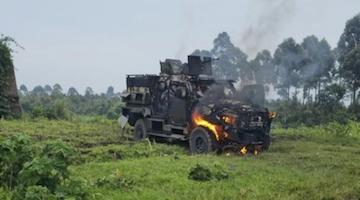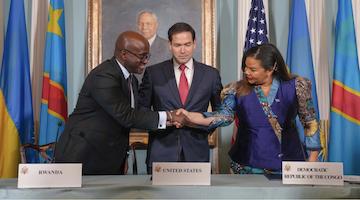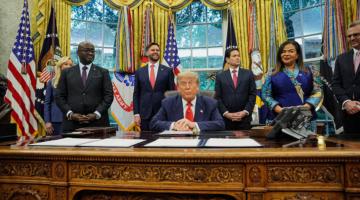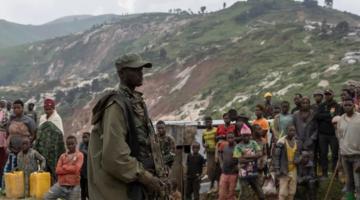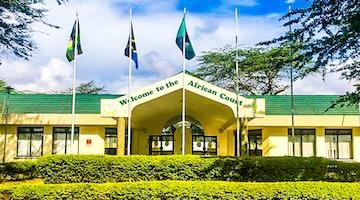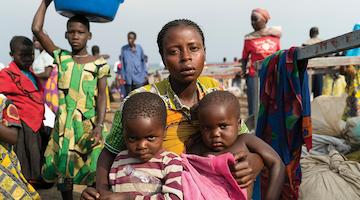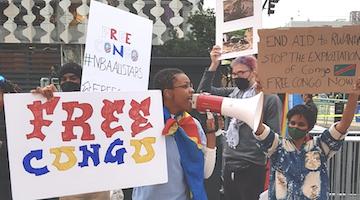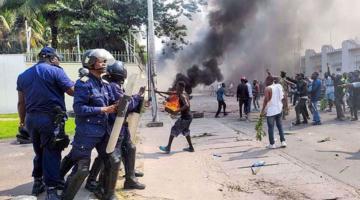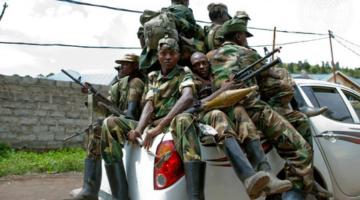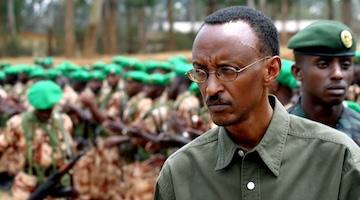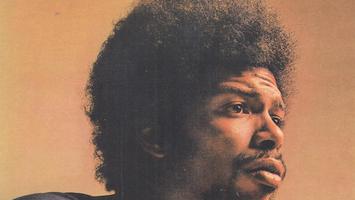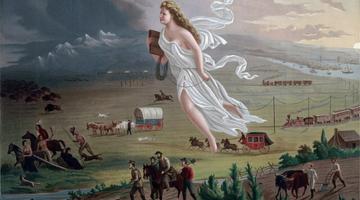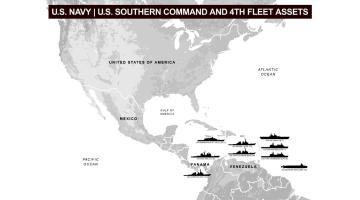Code Talking: UN Security Council on War and Peace in DR Congo / Photo: Martin Fayulu and Félix Tshisekedi
Congolese President Kabila wants to shut out the apparent winner of last month’s elections in favor the of the second place finisher, who appears to have accepted the deal.
“Congo’s elections commissioner threatened that the Kabila regime will remain in power if Congolese and the rest of the world do not accept their claim that Félix Tshisekedi won.”
Most UN Security Council (UNSC) meetings are so stuffy that they’re hard to watch without wishing someone would open a window, turn on the ventilator, or take the august ambassadors off life support. Norman Finkelstein couldn’t have been more apt than when he called Secretary General Ban-Ki-Moon a “comatose puppet of the United States.” I went through an entire pot of strong coffee just listening to last week’s three-hour UNSC meeting about the December 30 election in the Democratic Republic of the Congo (DRC). Congolese had turned out in unprecedented numbers, often waiting in the rain for hours to vote, so it seemed like the least I could do.
“No one mentioned the elephant in the room: US combat troops in Gabon to invade DRC with air support if so ordered.”
The ambassadors spoke in code, without naming key players and perpetrators. Their meanings were cloaked in mind-numbing repetitions of “provisional results,” “electoral process,” “restraint from violence,” “existing institutions,” “humanitarian challenges,” “fight against impunity,” etc., laced with occasional hints about the cards behind their backs. Most expressed regret about the Ebola outbreak and the “presence of armed groups” that compelled the postponement of voting in parts of eastern DRC’s North Kivu and Bandudu Provinces, but no one dared to say who was armed or who was arming them (most of all Uganda, Rwanda, and their international partners in resource theft). And no one mentioned the elephant in the room: US combat troops in Gabon to invade DRC with air support if so ordered.Acting United States Ambassador Jonathan R. Cohen came closest when he said, “We remain prepared to hold accountable individuals who threaten peace, stability, or security of the DRC, or undermine the DRC’s democratic process.” The State Department similarly exaggerated US jurisdiction in the press release on its website.
The Russian and Chinese ambassadors both spoke of DRC’s sovereignty without saying that the US should refrain from invading DRC. France and the UK, the other two permanent UNSC members with veto power, all expressed concern that the national election commission is not reporting accurate results, as it most certainly is not. At this point I’m not sure what they’re all up to, and I doubt they are either. There seems to be a lot of uncertainty and shifting sand, as was confirmed by a Congolese friend of mine who met with US State Department officials to argue for a democratic outcome. (The US has inordinate power in this part of the world as it does everywhere else. Who doesn’t fear its firepower and financial manipulations?)
“Kabila spent 18 years ransacking the country’s resources and doing nothing for the Congolese.”
Corneille Nangaa, the president of DRC’s national electoral commission (CENI), addressed the council via video link from the country’s capital, Kinshasa. He complained that the elections had been very difficult to organize because of widespread mistrust. (How’d that happen? They’re only two years behind schedule, and sitting president Joseph Kabila has only been in power for 18 years—which he’s spent ransacking the country’s resources and doing nothing for the Congolese.There were plenty of riot police outside the commission before it announced presidential candidate Félix Tshisekedi’s implausible victory over Martin Fayulu. And only 12 protestors have been shot dead since. So why worry?)
In cloaked words, Nangaa threatened that the Kabila regime will remain in power if Congolese and the rest of the world do not accept their claim that Félix Tshisekedi won. He said that there are only two options: accept the reported results, or return to “existing institutions” until a new election can be organized. (And keep in mind that this election finally took place two years after the constitutional deadline.)
Congo’s Catholic Church
Religious faith may be irrational, but the National Episcopal Conference of the Congo (COMEC), meaning its Catholic Church, has been the voice of reason, and democracy, in this election. It fielded nearly 40,000 trained observers, with at least one present at each polling station, ensuring 100 percent coverage.The data they collected was transmitted by mobile telephone networks or via satellite telephones to a national call center.
Archbishop Marcel Utembi also spoke to the council via video link from Kinshasa. He reported that the church worked closely with other accredited observer missions, including the Church of Christ in Congo, but remained independent of all parties and political platforms and received no funding from them.
He explained that, to monitor the election results, the National Episcopal Conference conducted a parallel vote count, based on a representative sample of about 11 percent of all voting stations, both rural and urban, providing a margin of error of one percent and a confidence rate of 95 percent. He also confirmed the impressive voter turnout. Regarding the provisional results reported by the national electoral commission, he said they didn’t match the church’s own tallies, and therefore called on the UNSC to act in solidarity with the people of the DRC and call on the electoral commission to publish data collected at each polling station as soon as possible. (Friends of the Congo’s Maurice Carney said that most of the votes have not even been counted and launched a petition, “Respect the People's Voice and Count Their Votes.”)
“The Church fielded nearly 40,000 trained observers, with at least one present at each polling station, ensuring 100 percent coverage.”
Dry stuff? Yes it is. Statistics usually are. But it’s not stuffy, evasive, pretentious, or dishonest like most UNSC meetings, including this one. It’s a convincing case for respecting the will of the Congolese people for the first time since Belgium and the US assassinated their independence hero and first elected Prime Minister, Patrice Lumumba.
Archbishop Utembi did not tell the council that Martin Fayulu won the presidential election. However, since the electoral commission said that Félix Tshisekedi won, and the church says that their tallies differ, we can assume that the church believes Martin Fayulu won. His reticence no doubt has to do with the church’s goal, which is honest elections, not support for one candidate or another, and its caution not to trigger violence. He said that “should there be any challenge to the outcome, we would then ask the UNSC to invite the relevant stakeholders to ensure that they prioritize the path of truth and peace while awaiting the outcome of any challenge, as this would go a long way towards ensuring peace and stability in our nation.”
But what if stakeholders, most specifically Kabila and his ruling party, refuse the invitation? They’ve clung to power for 18 years, and now appear to have struck a deal with second place finisher Félix Tshisekedi to keep Martin Fayulu from becoming DRC’s next president.
“Fayulu campaigned on promises to end the horrific violence in Congo’s Kivu Provinces.”
Fayulu is no Lumumba; he is a former Exxon-Mobil executive turned parliamentarian who formed alliances with billionaire Moise Katumbi and controversial businessman, politician, and former rebel commander—some say warlord—Jean-Pierre Bemba. Both Katumbi and Bemba vied for the presidency, but ultimately threw their support to Fayulu.
However, Fayulu campaigned on promises to end the horrific violence in Congo’s Kivu Provinces, and Congolese turned out in droves at his rallies. He is the candidate they no doubt chose, regardless of what the election commission reports. What recourse will the Congolese have if Kabila tries to crush their will again? Will the Church point to a way forward? Will Fayulu? And what about the UNSC?
Archbishop Utembi concluded by thanking the council for hearing the church’s report, and said, “We place your Security Council in the hands of God, hoping that he will guide you in fruitful consultations and actions that will promote peace in the Democratic Republic of Congo, our nation.”
Ann Garrison is an independent journalist based in the San Francisco Bay Area. In 2014, she received the Victoire Ingabire Umuhoza Democracy and Peace Prizefor her reporting on conflict in the African Great Lakes region. She can be reached at ann@anngarrison.com.
COMMENTS?
Please join the conversation on Black Agenda Report's Facebook page at http://facebook.com/blackagendareport
Or, you can comment by emailing us at comments@blackagendareport.com

